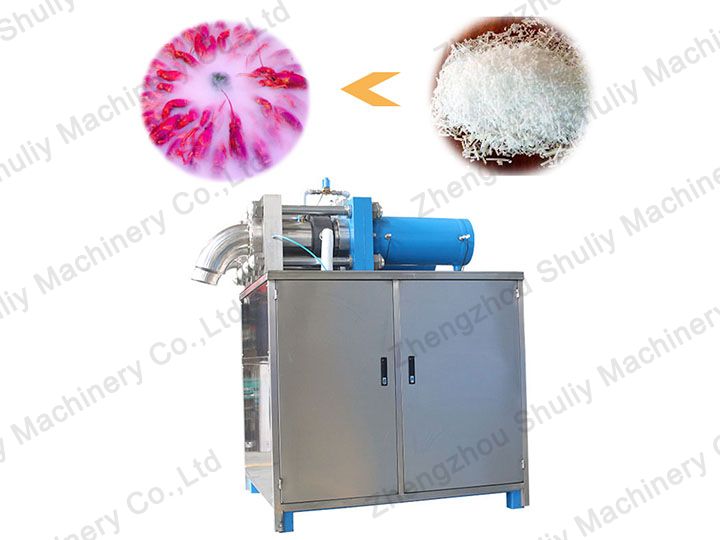Barafu kavu ina matumizi mengi tofauti, ikiwa ni pamoja na baridi, kusafisha, na usafirishaji. Viwanda kama vile utengenezaji wa chakula, huduma za afya, na usafirishaji hutegemea sana barafu kavu katika shughuli zao. Mchakato wa kutengeneza pellets kavu za barafu unahusisha mashine changamano na maalumu inayojulikana kama pelletizer kavu ya barafu. Katika makala hii, tutazama zaidi katika mada na kuchunguza kile kipeti kavu cha barafu ni na jinsi inavyofanya kazi.
Je! Pelletizer ya Barafu Kavu ni nini?
Kifaa cha kutengenezea barafu kavu ni mashine inayotumiwa kutengeneza vipande vidogo, vya duara vya barafu kavu. Barafu kavu hutengenezwa kwa kusukuma na kupoza gesi ya kaboni dioksidi hadi kwenye halijoto ya -109.3°F (-78.5°C). Kama aina nyingine za barafu, huwa imara kwenye halijoto hii, lakini ni ya kipekee kwa kuwa huchimbuka, au hubadilika moja kwa moja kutoka hali imara hadi gesi, bila kupitia awamu ya kimiminika. Vipande vya barafu kavu ndiyo aina maarufu zaidi ya barafu kavu kwa matumizi ya viwandani kwa sababu havi na sumu, havi na uwezo wa kuendesha umeme, na haviachi mabaki yoyote. Mchakato wa kutengeneza vipande hivi huhitaji mashine maalum inayoitwa kifaa cha kutengenezea barafu kavu.
Je, Pelletizer ya Barafu Kavu Inafanyaje Kazi?
Pelletizer ya barafu kavu huchukua dioksidi kaboni ya kioevu, ambayo huhifadhiwa kwenye tangi na kuibadilisha kuwa barafu kavu ngumu. Mchakato una hatua kadhaa:
Dioksidi kaboni ya kioevu huingizwa kwenye vyombo vya habari vya hydraulic. Vyombo vya habari hutumia shinikizo la juu, kukandamiza dioksidi kaboni ndani ya kuzuia imara.
Kisha kuzuia imara huhamishiwa kwenye pelletizer. Auger au ukanda wa conveyor hutumiwa kuhamisha barafu kavu kutoka kwa vyombo vya habari hadi kwenye pelletizer.
Barafu kavu huvunjwa vipande vidogo na kulishwa kupitia extruder au kufa. Extruder hutumia shinikizo na kubana barafu kavu zaidi katika maumbo ya silinda.
Mitungi ya barafu iliyobanwa kisha inalishwa kupitia sahani iliyo na mashimo mengi madogo. Sahani ya kufa hutengeneza mitungi kuwa pellets, ambazo hukusanywa kwenye vyombo vya kuhifadhia au mifuko.
Pellets zimefungwa na tayari kutumika kwa matumizi mbalimbali.
Vifaa vya kutengenezea barafu kavu vinaweza kuzalisha kiasi kikubwa cha vipande kwa haraka na kwa ufanisi, vikiwafanya kuwa vifaa muhimu kwa tasnia zinazotumia barafu kavu. Vifaa vingi vya kisasa vya kutengenezea pia vina vipengele vya kudhibiti halijoto na ufuatiliaji wa shinikizo.
Matumizi ya Pellets Kavu za Barafu
Pellet za barafu kavu zina matumizi anuwai, pamoja na:
Usafirishaji na uhamishaji: Vipande vya barafu kavu vinaweza kuweka bidhaa kwenye ubaridi wakati wa usafirishaji. Hii ni muhimu sana kwa tasnia za chakula na dawa ambazo zinahitaji kuweka bidhaa zao kwenye halijoto fulani wakati wa usafirishaji.
Kusafisha nyuso: Vipande vya barafu kavu vinaweza kuondoa kutu, rangi, na vifaa vingine kutoka kwenye nyuso bila kuacha uchafu au mabaki yoyote.
Kupoeza: Vipande vya barafu kavu vinaweza kutumika kupoeza vitu kama bidhaa za chakula wakati wa uzalishaji au kupoeza chumba au eneo ikiwa kuna moto.
Athari maalum: Vipande vya barafu kavu vinaweza kutumika kuunda athari maalum kama vile ukungu au moshi katika maonyesho ya ukumbi wa michezo, mipakani mwa mbuga za mandhari, na kumbi zingine za burudani.
Hitimisho
Pelletizer kavu ya barafu ni mashine maalum inayotumiwa kugeuza kaboni dioksidi kioevu kuwa pellets ndogo za silinda za barafu kavu. Pellet hizo hutumiwa katika tasnia mbali mbali kama vile utengenezaji wa chakula, huduma ya afya, usafirishaji, usafishaji, na athari maalum. Mchakato wa kufanya pellets kavu ya barafu ni ngumu na inahitaji shinikizo la juu na ukandamizaji. Barafu kavu ni ya kipekee kwa kuwa haina sublima, kumaanisha kuwa inabadilika moja kwa moja kutoka kwa kigumu hadi gesi bila kupitia awamu ya kioevu. Hii inaifanya kuwa maarufu katika tasnia zinazohitaji hatua za kupoeza zisizo na sumu, zisizo za conductive na zisizo na mabaki.
Pelletti za barafu kavu ni sehemu muhimu kwa tasnia mbalimbali, na uvumbuzi wa pelletizer kavu ya barafu imeleta mapinduzi katika utengenezaji wa pellets kavu za barafu. Pelletizer ni chombo cha kuaminika ambacho huzalisha kwa usahihi pellets thabiti, za ubora wa juu, na kuifanya uwekezaji muhimu kwa viwanda vinavyotumia barafu kavu. Mustakabali wa teknolojia ya barafu kavu ni mzuri, na tunaweza kutarajia kuona ubunifu katika utengenezaji na utumiaji wa barafu kavu katika miaka ijayo.

